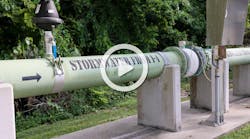Transocean to Pay $400 Million in Penalties for Deepwater Horizon Disaster
Transocean Deepwater Inc. pleaded guilty to a violation of the Clean Water Act (CWA) for its illegal conduct leading to the 2010 Deepwater Horizon disaster, and was sentenced to pay $400 million in criminal fines and penalties, Attorney General Holder announced.
In total, the amount of fines and other criminal penalties imposed on Transocean are the second-largest environmental crime recovery in U.S. history—following the historic $4 billion criminal sentence imposed on BP Exploration and Production Inc. in connection with the same disaster.
Transocean’s guilty plea was accepted, and the sentence was imposed, by U.S. District Judge Jane Triche Milazzo of the Eastern District of Louisiana. During the guilty plea and sentencing proceeding, Judge Milazzo found, among other things, that the sentence appropriately reflects Transocean’s role in the offense conduct, and that the criminal payments directed to the National Academy of Sciences and National Fish and Wildlife Foundation are appropriately designed to help remedy the harm to the Gulf of Mexico caused by Transocean’s actions. The judge also noted that the fines and five-year probationary period provide just punishment and adequate deterrence.
Transocean pleaded guilty to any information, previously filed in federal court in New Orleans, charging the company with violating the CWA. During the guilty plea proceeding, Transocean admitted that members of its crew onboard the Deepwater Horizon, acting at the direction of BP’s well site leaders, known as “company men,” were negligent in failing to investigate fully clear indications that the Macondo well was not secure and that oil and gas were flowing into the well.
The criminal resolution is structured to directly benefit the Gulf region. Under the order entered by the court pursuant to the plea agreement, $150 million of the $400 million criminal recovery is dedicated to acquiring, restoring, preserving and conserving—in consultation with appropriate state and other resource managers—the marine and coastal environments, ecosystems and bird and wildlife habitat in the Gulf of Mexico and bordering states harmed by the Deepwater Horizon oil spill. This portion of the criminal recovery will also be directed to significant barrier island restoration and/or river diversion off the coast of Louisiana to further benefit and improve coastal wetlands affected by the spill. An additional $150 million will be used to fund improved oil spill prevention and response efforts in the Gulf through research, development, education and training.
The guilty plea and sentencing announced are part of the ongoing criminal investigation by the Deepwater Horizon Task Force into matters related to the April 2010 Gulf oil spill.
Source: EPA


